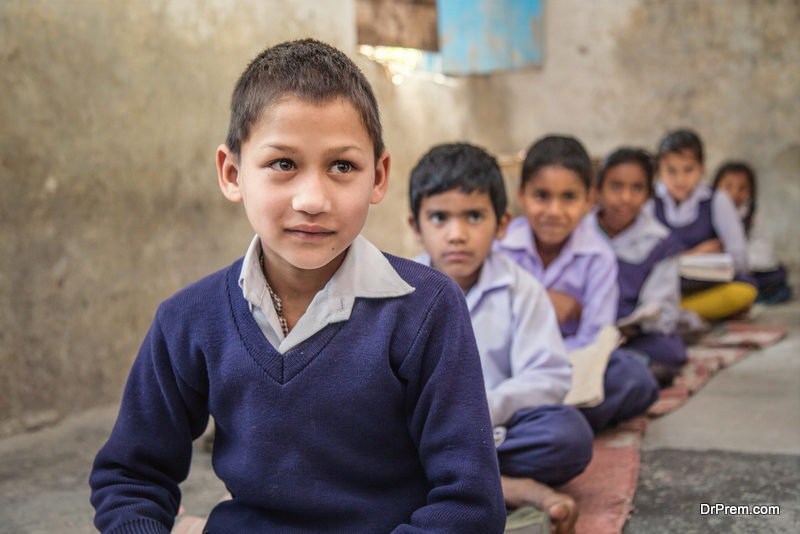Nobody likes to be poor. Poverty entails a lot of other hardships along with itself, amongst which its permanence is probably the worst. Individuals born and raised in poverty have to combat not just with financial difficulties but with a state of mind as well, which labels them as poor, and which expects them to accept poverty as a condition of life. The only thing that could probably save such people from this condition is a good education. But, rather than alleviating this state of mind, the education that they are provided usually ends up re-affirming it. It makes them more conscious of their inequality. So, before introducing any other reform, it is necessary to solve educational inequality first, as only then the other reforms would be meaningful.
Mistaken efforts towards solving educational inequality
The problem has multiple dimensions, so the solution too isn’t something that an organization can tackle singlehandedly. Either the government needs to plan accordingly, or multiple Non Governmental Organizations need to come together and bring in a more focused effort. It would be impossible to solve educational inequality if we do not work on the following mistakes:
1. Lack of serious effort:
 The problems are not new, and efforts are indeed being done to tackle them worldwide. The only problem, however, is that they are being done in the spirit of charity, and not with the spirit of educating someone, and bringing a change into their life. The institutions involved in educating the underprivileged are either government funded or they belong to non-government organizations (NGOs). In government institutions, most of the employees lack either qualification or competence, and are mostly poorly paid. On the other side, the efforts by NGOs are quite sporadic. The teachers mostly are part time and are expected to do the work in the spirit of charity.
The problems are not new, and efforts are indeed being done to tackle them worldwide. The only problem, however, is that they are being done in the spirit of charity, and not with the spirit of educating someone, and bringing a change into their life. The institutions involved in educating the underprivileged are either government funded or they belong to non-government organizations (NGOs). In government institutions, most of the employees lack either qualification or competence, and are mostly poorly paid. On the other side, the efforts by NGOs are quite sporadic. The teachers mostly are part time and are expected to do the work in the spirit of charity.
2. Lack of permanence:
Any effort that is not permanent is of no use. Rather than sending a teacher to teach people in slums once a week, it is better to send no one at all. Such sporadic visits might be of help to the teachers who are sent, as it might provide them better experience. However, it would do little good to the students, who might be looking at the teacher as someone who might bring them out of the vicious circle of poverty. At worst, the presence of teacher might remind them of the affluent world outside, which they can never be a part of.
3. No attention to the psychological health:
 As the saying goes, ‘The laws are only for the rich’. Poverty is one of the biggest motivations for crime, and the poor, in turn, are its most common targets, as it is comparatively difficult for them to seek justice. This makes crimes like domestic violence, drugs, and child abuse very common amongst the poor. Apart from the immediate impact, all these things also have a very lasting impact on the personality of an individual who suffers from them. These make them highly prone to mental health disorders and increase their tendency of falling into crime.
As the saying goes, ‘The laws are only for the rich’. Poverty is one of the biggest motivations for crime, and the poor, in turn, are its most common targets, as it is comparatively difficult for them to seek justice. This makes crimes like domestic violence, drugs, and child abuse very common amongst the poor. Apart from the immediate impact, all these things also have a very lasting impact on the personality of an individual who suffers from them. These make them highly prone to mental health disorders and increase their tendency of falling into crime.
We might blame someone later on for turning into a murderer or a rapist, but we often forget that this is of the cumulative result of the toxic environment that they lived in. We need to discover and heal their psychological wounds before properly educating them, as only then they would be able to receive education like one is supposed to. Evaluating the psychological health should be one of the primary objectives towards solving educational inequality, but so far little attention has been paid to this aspect of the issue.
4. Little Motivation for the teachers:
Most of the times the jobs that are reserved for teaching the poor are either taken up by teachers who are not qualified enough or by those who are not competent enough. Many highly skilled people also teach the poor every once in a while, but they don’t do it full time, as that won’t pay them good enough. On the other hand, if opportunities that paid at least equal to what one usually gets at reputed universities, there is no dearth of skilled and qualified teachers who would love to work for the betterment of the society.
5. Improper management of Funds
 What are beggars? Beggars are usually people who advertise their poverty for monetary gains. When you look at it, it isn’t just the beggars; there are a lot of governmental and nongovernmental organizations too that are doing the same. They just use the poor as the face to gather funds, which they ultimately end up using for their own personal use. Since it is very hard to check the work done by such ventures, very often they fall prey to corruption. Every other day we see people donating exceptional amounts to charities. There is no dearth of money for the poor. But either this money doesn’t reach the people that it is intended to reach or it is not utilized as effectively as it should.
What are beggars? Beggars are usually people who advertise their poverty for monetary gains. When you look at it, it isn’t just the beggars; there are a lot of governmental and nongovernmental organizations too that are doing the same. They just use the poor as the face to gather funds, which they ultimately end up using for their own personal use. Since it is very hard to check the work done by such ventures, very often they fall prey to corruption. Every other day we see people donating exceptional amounts to charities. There is no dearth of money for the poor. But either this money doesn’t reach the people that it is intended to reach or it is not utilized as effectively as it should.
6. Inability to offer a better prospect
Money is probably the thing that motivates one the most towards education. Amongst the poor there’s hardly anyone who would like to spend hours every day for something which won’t be of any monetary help to them in the future. An educated individual definitely gets better employment opportunities than someone who is not, but it isn’t something evident to someone who is not illiterate. A promise of better employment opportunities is necessary to keep one motivated.
Final Words
Each one of us is endowed with capabilities, which, if manifested fully, would not only help us in improving the standard of our life, but would also help us in contributing positively towards the betterment of the society. Education is something which helps us is in identifying these capabilities in ourselves. More than anyone else, the people struggling to break free from the shackles of the poverty need it. Until we solve educational inequality we cannot progress as a nation.




